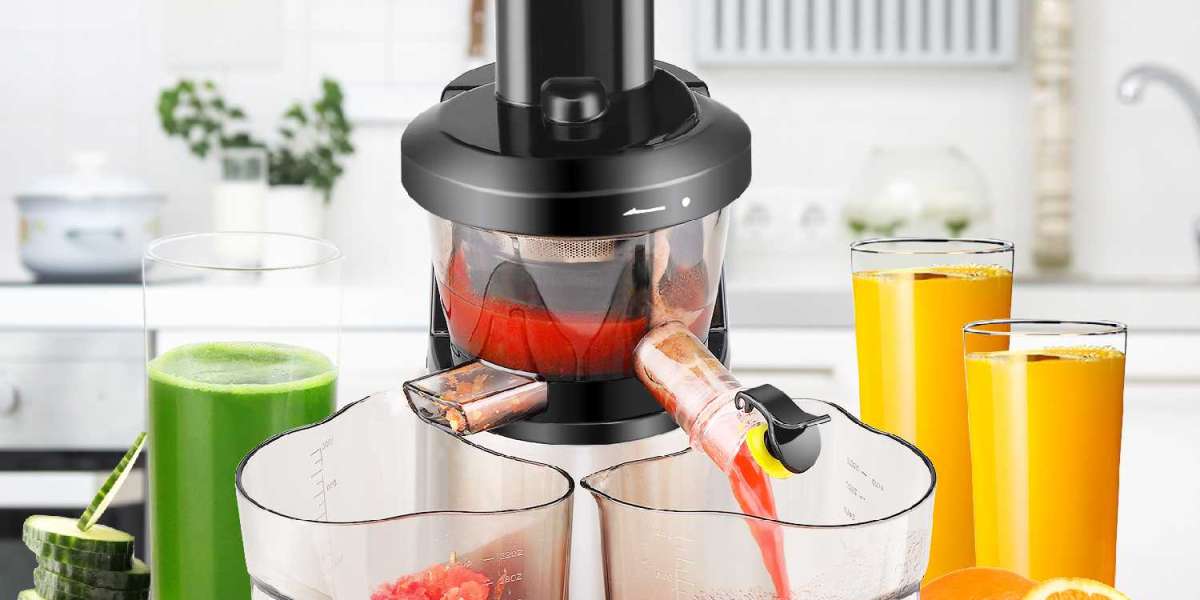In a busy commercial environment like a café, restaurant, or juice bar, the right equipment can make all the difference. A Commercial Juicer is one such piece of equipment that can significantly streamline operations by allowing you to serve fresh, nutritious drinks efficiently. These machines are engineered to process large quantities of fruits and vegetables quickly, making them indispensable for businesses with high demand.
Understanding the basics of commercial juicers can help you make an informed choice that suits your specific needs. These machines vary widely in terms of capacity, speed, and juice quality, among other factors. While some juicers are designed for speed, others focus on extracting juice with maximum nutritional value.
Introduction to Commercial Juicers
It’s essential to consider the type of produce you plan to juice most frequently. For instance, some machines handle leafy greens better than others, while some are optimized for citrus fruits. Knowing these nuances will guide you in selecting the right model.
Another important aspect to consider is the ease of maintenance. Regular cleaning and proper maintenance are crucial to keep the machine in good working order and to ensure hygiene standards are met. Taking the time to familiarize yourself with these machines and their requirements can help you get the most out of your investment.
Types of Commercial Juicers
Centrifugal juicers operate by spinning fruits and vegetables at high speeds, using a blade to separate juice from the pulp. They are suitable for businesses needing quick results, although they may not be the best for leafy greens or wheatgrass.
Masticating juicers, also known as slow or cold press juicers, use a crushing and pressing method to extract juice. These machines are recognized for retaining more nutrients and work well with various fruits and vegetables, including leafy greens.
Triturating juicers, or twin-gear juicers, are highly efficient and produce superior quality juice by grinding and pressing the produce. While often more costly, they are ideal for businesses focused on quality and nutrient retention.
Citrus juicers are specifically designed for extracting juice from citrus fruits like oranges and lemons. These machines are typically fast and straightforward to use, making them perfect for establishments serving fresh citrus juice.
Understanding the specific advantages of each type can guide your decision-making process. Centrifugal juicers offer speed, masticating juicers provide nutrient-rich juice, triturating juicers deliver the highest quality, and citrus juicers specialize in citrus fruits.
Choosing the Right Commercial Juicer Machine
Selecting the right Commercial Juicer Machine involves considering several factors:
- Capacity: Assess your daily juice production needs. Larger establishments may require a machine with a higher capacity to meet demand efficiently.
- Speed: Depending on your business requirements, speed might be a critical factor. Centrifugal juicers provide quick results, while masticating and triturating juicers take longer but yield higher quality juice.
- Ease of cleaning: Opt for models that are easy to disassemble and clean, as regular cleaning is essential for hygiene and machine longevity. This also ensures minimal downtime in a busy commercial setting.
- Durability: Commercial juicers should be robust and built to withstand heavy use. Look for machines made from high-quality materials and with strong warranties.
- Energy efficiency: Energy consumption can impact your operational costs. Choose a juicer that balances performance with energy efficiency.
- Noise levels: In some settings, noise can be a concern. Consider juicers known for quieter operation to maintain a pleasant environment for your staff and customers.
Compare different brands and models, paying attention to reviews and feedback from other users in similar business settings. Your choice should balance your need for speed, juice quality, ease of maintenance, durability, energy efficiency, and noise levels. Prioritizing these factors will help you find a juicer that suits your business needs perfectly.
Installation and Setup
Proper installation and setup are key to getting the best performance from your commercial juicer. Begin by unpacking the juicer carefully, ensuring all components are present and undamaged. Follow the manufacturer’s assembly instructions step-by-step to ensure each part is correctly and securely attached.
Place the juicer on a stable, flat surface near a power source to avoid strain on the power cord. Make sure the location allows for easy access and is free from potential hazards. Check that the power cord is not stretched or at risk of being damaged.
Before you start using the juicer, it’s advisable to run a test cycle with water. This will help to remove any residues from the manufacturing process and ensure that all parts are functioning correctly.
Next, familiarize yourself with the controls and safety features of your juicer. Understand how to operate it safely and efficiently to avoid any mishaps. Position a container under the spout to collect the juice and make sure the pulp container is correctly aligned.
Ensure that all removable parts, like the feeding chute and juice container, are securely in place. This prevents any spills or malfunctions during operation. By following these setup guidelines, you can ensure your commercial juicer operates smoothly and efficiently from the start.
Operation Guidelines
Efficient operation starts with preparing your fruits and vegetables properly. Thoroughly wash all produce and cut it into sizes appropriate for your juicer. Some models may require smaller pieces, while others can handle whole fruits with ease.
When using the juicer, feed the produce steadily and avoid overloading the chute. This practice ensures optimal juice extraction and minimizes unnecessary strain on the motor. It's important to become familiar with the safety features of your machine, such as automatic shut-off and anti-jam functions, to operate it safely and efficiently.
Always follow the manufacturer's instructions regarding the type and size of produce that your machine can handle. This will help prevent jams and blockages, which can lead to operational issues. Additionally, use the pusher provided with the machine to guide the produce into the chute, rather than using your hands or other objects.
Monitor the juice and pulp containers during operation, and empty them as needed to prevent overflow. If your machine has multiple speed settings, use the appropriate speed for the type of produce you are juicing. Softer fruits may require a lower speed, while harder vegetables might need a higher setting.
By following these guidelines, you can ensure your commercial juicer operates smoothly and efficiently, delivering high-quality juice to your customers.
Maintenance and Cleaning
Regular maintenance is essential to keep your commercial juicer in optimal condition. Start by disassembling the machine after each use and clean all removable parts with warm, soapy water. Use a soft brush to remove any pulp or juice residues, paying special attention to the filter and blades. Avoid abrasive materials that might scratch or damage the components. Once cleaned, rinse all parts thoroughly and allow them to air dry completely before reassembling.
Periodically, it’s a good idea to deep clean your juicer. Soak the removable parts in a solution of water and mild detergent or a mixture of water and white vinegar to break down any stubborn residues. For the motor base, wipe it down with a damp cloth, ensuring no water gets into the motor or electrical components. Always unplug the juicer before performing any cleaning or maintenance tasks.
Additionally, inspect the juicer for signs of wear and tear, such as cracks or chips, especially in the blades and seals. Replace any damaged or worn-out parts promptly to maintain efficiency and safety. Check the manufacturer’s guidelines for specific maintenance advice and recommended cleaning products to ensure you’re caring for your juicer correctly.
Maintaining a regular cleaning schedule not only extends the lifespan of your machine but also ensures the quality and safety of the juices you serve.
Troubleshooting Common Issues
Common problems with commercial juicers include jams, blockages, and leaks. Jams often occur due to overloading the machine or not cutting produce into appropriate sizes. To resolve a jam, switch off the juicer and carefully remove the obstruction.
Leaks usually result from improperly assembled parts or worn-out seals. Ensure all components are properly aligned and replace any damaged seals to prevent leaks. If you notice a decline in juice quality or efficiency, it might be due to dull blades or a clogged filter. Regularly check these parts and clean or replace them as necessary.
Overheating can also be an issue, especially with extended use. Allow the juicer to cool down periodically to prevent overheating. If the motor shuts off unexpectedly, it might have an automatic thermal cut-off feature to protect against overheating. In such cases, allow the machine to cool before restarting.
Unusual noises during operation could indicate loose parts or a misaligned component. Turn off the juicer and inspect it for any loose screws or misaligned elements. Tighten or realign as needed.
Always consult the manufacturer's manual for specific troubleshooting advice tailored to your juicer model. Properly addressing these common issues ensures your juicer operates efficiently and safely.
Benefits of Using Commercial Cold Press
Commercial Cold Press juicers, also known as masticating juicers, excel in preserving the natural flavors and nutrients of fruits and vegetables. The slow extraction process ensures that vital vitamins, minerals, and enzymes remain intact, offering a healthier drink option. Unlike centrifugal juicers, cold press juicers minimize oxidation, which not only maintains the vibrant color of the juice but also extends its shelf life. This slow method of juicing results in a richer, more intense flavor profile, making each glass of juice a delightful experience for customers.
Another benefit is the reduced foam and separation in the final product, leading to a more appealing presentation. Cold press juicers are also highly efficient at extracting juice from leafy greens and other hard-to-juice produce, ensuring minimal wastage and maximum yield. Moreover, these juicers operate quietly, making them ideal for use in environments where noise levels need to be kept low.
By opting for a commercial cold press juicer, businesses can offer a superior quality product that stands out in terms of taste and nutritional value, meeting the growing consumer demand for health-conscious options.
Conclusion
By selecting the appropriate commercial juicer, you ensure your business can efficiently produce high-quality juices tailored to your specific needs. It's crucial to balance speed, capacity, and juice quality when choosing a machine. Regular maintenance and proper operation are essential for extending the lifespan of your equipment and maintaining hygiene standards. Understanding the benefits of different juicers, such as the nutrient retention in masticating juicers or the quick results from centrifugal models, helps you make an informed decision. Embrace the potential of a commercial juicer to offer your customers a superior product that meets the growing demand for fresh, nutritious beverages.
FAQs
Q: How often should I clean my commercial juicer?
A: For optimal performance and hygiene, clean your juicer after each use to prevent residue build-up.
Q: Can I juice any type of fruit or vegetable with a Commercial Cold Press juicer?
A: While most commercial juicers handle a wide variety of produce, certain models are better suited for specific types, such as leafy greens or citrus fruits.
Q: Are cold press juices really healthier?
A: Cold press juices retain more nutrients and enzymes compared to juices made with centrifugal juicers, resulting in a healthier beverage.
Q: How do I know if my juicer needs a replacement part?
A: Inspect your juicer regularly for signs of wear or damage, such as cracks, chips, or reduced performance, and replace any parts as necessary.
Related Business Listings |








